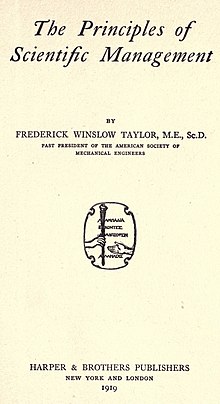The Principles of Scientific Management

The Principles of Scientific Management
|
|
| Author | Frederick Winslow Taylor |
|---|---|
| Subject | Scientific management |
| Genre | Monograph |
| Publisher | Harper & Brothers |
|
Publication date
|
1911 |
| Pages | 144 |
The Principles of Scientific Management (1911) is a monograph published by Frederick Winslow Taylor. This laid out Taylor's views on principles of scientific management, or industrial era organization and decision theory. Taylor was an American manufacturing manager, mechanical engineer, and then a management consultant in his later years. The term "scientific management" was taken from Louis Brandeis to coordinate enterprise for everyone's benefit, but under Taylor's system of thought, workers became seen as commodities or resources that should be manipulated for profit. His approach is also often referred to as Taylor's Principles, or Taylorism.
The monograph consisted of three sections: Introduction, Chapter 1: Fundamentals of Scientific Management, and Chapter 2: The Principles of Scientific Management.
Taylor started this paper by quoting then President of the United States, Theodore Roosevelt: "The conservation of our national resources is only preliminary to the larger question of national efficiency". Taylor pointed out that while a large movement had started to conserve material resources, the less visible and less tangible effects of the wasted human effort was only vaguely appreciated. He argues the necessity of focusing on training rather than finding the "right man", stating "In the past the man has been first; in the future the system must be first", and the first goal of all good systems should be developing first-class men. He listed three goals for the work:
First. To point out, through a series of simple illustrations, the great loss which the whole country is suffering through inefficiency in almost all of our daily acts.
Second. To try to convince the reader that the remedy for this inefficiency lies in systematic management, rather than in searching for some unusual or extraordinary man.
Third. To prove that the best management is a true science, resting upon clearly defined laws, rules, and principles, as a foundation. And further to show that the fundamental principles of scientific management are applicable to all kinds of human activities, from our simplest individual acts to the work of our great corporations, which call for the most elaborate cooperation. And, briefly, through a series of illustrations, to convince the reader that whenever these principles are correctly applied, results must follow which are truly astounding.
...
Wikipedia
